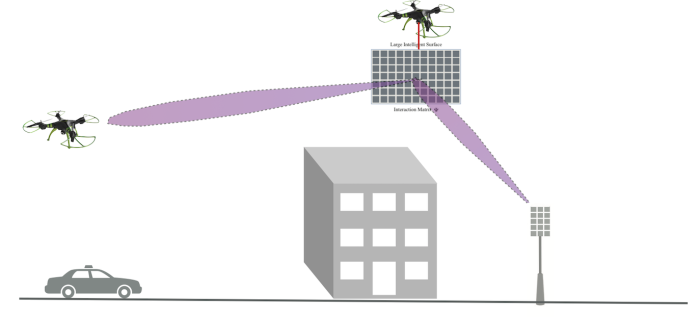Machine Learning Applications
Beam Focusing for Wideband Near Field Massive MIMO Systems
We propose a low-complexity frequency-aware beamforming solution that is designed for hybrid time-delay and phase-shifter based RF architectures. To reduce the complexity, the joint design problem of the time delays and phase shifts is decomposed into two subproblems ... read more
Interference Nulling in Hardware-Constrained mmWave MIMO Systems
We propose an efficient deep reinforcement learning approach that learns how to iteratively optimize the beam pattern to null the interference. The proposed solution achieves that while not requiring any explicit channel knowledge of the desired or interfering users and without requiring any coordination with the interferers ... read more
Learning Reflection Codebooks for Reconfigurable Intelligent Surfaces
We develop a novel deep reinforcement learning based framework to efficiently construct the RIS reflection codebook. This framework adopts a multi-level design approach that transfers the learning between multiple RIS subarrays, which speeds up the learning convergence and highly reduces the computational complexity for extremely large RIS surfaces ... read more
Situation-Aware Channel Covariance Prediction for Massive MIMO Systems
We propose a novel deep learning based situation-aware channel covariance prediction solution for Highly-Mobile FDD massive MIMO systems. The BS acquires the locations with different levels of uncertainty, which are in turn leveraged to predict the channel statistics for downlink beamforming design ... read more
Learning Beam Codebooks in mmWave/THz MIMO System
We develop a deep reinforcement learning framework that learns how to optimize the codebook beams relying only on the power measurements. The developed model learns how to adapt the beam patterns based on the surrounding environment, user distribution, hardware impairments, and array geometry, with a full respect of the given constraints ... read more
Neural Networks Based mmWave Massive MIMO Beam Codebooks
We develop an efficient online machine learning framework that intelligently learns site and hardware specific codebook beam patterns. This is done by designing a novel complex-valued neural network architecture in which the neuron weights directly model the beamforming weights of the analog phase shifters ... read more
Deep Reinforcement Learning for Intelligent Reflecting Surfaces
We propose a novel deep reinforcement learning framework for predicting the IRS reflection matrices with minimal beam training overhead. Simulation results show that the proposed online learning framework can converge to the optimal rate that assumes perfect channel knowledge ... read more
mmWave Beam and Blockage Prediction Using Sub-6GHz Channels
We prove and show that under certain conditions, there exists mapping functions that can predict the optimal mmWave beam and blockage status directly from the sub-6 GHz channel. This can be achieved by leveraging a large enough neural network, which is empirically validated by the simulation results ... read more
Channel Estimation for Massive MIMO with One-Bit ADCs
We propose a deep learning based framework for the channel estimation problem in massive MIMO systems with 1-bit ADCs, where the prior channel estimation observations and deep neural networks are exploited to learn the mapping from the received highly quantized measurements to the channels ... read more
Mapping Channels in Space and Frequency
We introduce the new concept of channel mapping in space and frequency, where the channels at one set of antennas and one frequency band are mapped to the channels at another set of antennas and frequency band. This highlights a novel solution for reducing the training and feedback overhead in mmWave and massive MIMO systems ... read more
Direct Hybrid Precoding in mmWave Massive MIMO Systems
We propose a novel neural network architecture, that we call an auto-precoder, and a deep-learning based approach that jointly senses the mmWave channel and designs the hybrid precoding matrices with only a few training pilots. The proposed approach significantly reduces the training overhead compared to classical (non-machine learning) solutions ... read more
Deep Learning for Large Intelligent Surfaces
We devise a novel LIS architecture based on sparse channel sensors, where all the LIS elements are passive except for a few elements that are active (connected to the baseband of the LIS controller). We also develop two novel solutions, based on compressive sensing and deep learning, that design the LIS reflection matrices with negligible training overhead ... read more
Channel Covariance Prediction using Generative Adversarial Networks
We develop a novel solution that exploits machine learning tools, namely conditional generative adversarial networks (GAN), to learn the functions between the environment and the channel covariance matrices, which dramatically reduces the training overhead needed to obtain the channel knowledge ... read more
Blockage Prediction and Proactive Handoff
We propose a novel machine learning based solution to tackle the reliability and latency challenges in mmWave MIMO systems. Simulation results show that the developed deep learning based strategy successfully predicts blockage/hand-off in close to 95% of the times ... read more
Millimeter Wave Beam Prediction Based on Multipath Signature
We develop a novel integrated machine learning and coordinated beamforming solution to overcome the challenges encountered in the highly-mobile mmWave systems, such as coverage, reliability and latency, etc., which has the potential of supporting high mobility applications in the real-world mmWave systems ... read more

